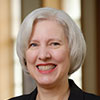This article is more than 5 years old.
Advocacy, metadata standards, and a tech services perspective on digital projects formed the cruces of my conference, but I gleaned a few Ex Libris updates too.
Metadata, Standards, Digital Projects
- I participated with Erik Mitchell and Jenn Riley in a Metadata Standards presentation about using the Principles for Evaluating Metadata Standards developed by the ALCTS/LITA Metadata Standards Committee. We had ~70 people: the most I’ve ever stood in front of. Up on a dais. (Y’all know how glad I am that is done!)
- In the “Creating the Future of Digital Scholarship Together: Collaboration from Within Your Library” session, I learned about a cool free tool called Cytoscape, “an open source software platform for visualizing complex networks and integrating these with any type of attribute data.” The data is hosted at UC San Diego, not on your own server. Presenter Matt Carruthers (University of Michigan) has a poster-like overview of the content of his presentation – understand at a glance! My favorite large-scale archival project, SNAC, and a key standard, EAC-CPF, are involved in this UM project. Cytoscape visualization enables some serendipitous discovery, so that people can literally see connections, as this kind of networking/relationship display software will do. Cytoscape was extolled for having a low learning curve and for taking less than 10 mins to create a visualization. The project presented was a proof of concept, so it is not public yet. Accessibility was mentioned as a concern. Other presenters in this session talked about crossing internal organizational boundaries while working on digital projects. We do some of that here too. Presenters from University of Nevada, Reno showed a graphic of a workflow for Name Authority Record (NAR) creation in a digital project. They joined NACO to be able to make the authority record contributions so as to make discoverable their locally famous people who are connected to nationally famous people. Basically, the digital intiatives student workers check the Library of Congress Name Authority File (LCNAF) first, followed by a few other sources (SNAC and VIAF were mentioned), and use what they find. Or, if they don’t find anything, the students handoff to Cataloging for NAR creation. Closing the loop, Cataloging feeds anything they create into the digital project metadata. They are using an application called Airtable that bills itself as a spreadsheet with the power of database.
- The ALCTS/LITA Metadata Standards Committee met and made decisions about future directions for the work of the Committee, partly based on post-presentation discussion with audience members.
Advocacy
- Members of ALCTS Advocacy & Policy Committee handed out business cards for the committee, with a new public email address on one side and our Issues web page (recently refreshed) on the other, and asked ALCTS members to let us know their top concerns related to legislation in progress in Washington, DC (copyright? net neutrality? LSTA funding?) Cards were given out at several ALCTS Section meetings, the Division Chairs meeting, and to individuals as opportunities arose. Raising awareness was as much of a goal as soliciting membership input.
- We discussed what actions the committee needs to take around S.960 – Preserving Data in Government Act of 2017 and decided on concrete next steps, along with more mundane agenda items, and brainstormed some fresh ideas for promoting advocacy in ALCTS.
Alma Updates from Ex Libris, Focus on Analytics
- Analytics with _ benchmarking_ is coming in Aug 2017 release
- Can’t really look at COUNTER reports in Excel because they are in XML, but dashboard with visualization (charts) is simple and is designed so you don’t have to spend time looking at nitty gritty spreadsheets, just go to big picture right away
- Already have SUSHI harvesting of COUNTER data
- New UI for all of ALMA except analytics, which is the Oracle interface
- Future: ability to see overlaps of ebook and print book and can see if ebook gets more use than print book

2 Comments on ‘Lauren at ALA Annual 2017 in Chicago’
Thank you, Lauren, for this report and congrats on a successful and well-attended presentation! I’d love to hear more about Cytoscape and discuss how we might collaborate on using/teaching this cool tool.
I’m glad your presentation went well! I heard you did a great job.